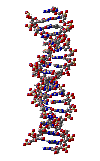|
Single nucleotide polymorphisms and forensic genetics, maybe not such a perfect combination (10/2004)
Forensic genetics is the branch of genetics that, through DNA analysis and comparison, deals with the resolution of legal problems such as paternity tests. Recently, it has been proposed that single nucleotide polymorphisms (SNPs) could be used as a new genetic marker in the field eventually even replacing the methods/markers now employed. But in an article just published online in Forensic Science International1,a team of scientistschallenges the effectiveness of SNPs in kinship studies predicting an increase in inconclusive cases when these markers are used.
In forensic genetics, DNA samples are analysed through the comparison of particular DNA sequences unique to each individual. In fact, although more than 99% of the genome is the same across the human population, variations in DNA sequence called polymorphisms can be used to both differentiate and correlate individuals.
Short Tandem Repeats (STRs) are the genetic markers most commonly used in this moment by forensic scientists. STRs consist of repetitive segments of DNA two to five nucleotides (DNA building blocks) length found throughout the genome with different individuals having different STRs combinations.
Recently however, another type of genetic marker called SPNs (single nucleotide polymorphisms), which consists in DNA sequence variations that result from alterations in a single nucleotide in the genome sequence, has been considered to replace STRs in forensic investigations. SNPs seem to have several advantages over STRs as not only they are a more stable genetic marker and so are less likely to be lost across generations which is crucial in paternity cases, but they are also cheaper, easier and faster to examine and need much smaller DNA samples.
But now António Amorim and Luísa Pereira at IPATIMUP (Institute of Pathology and Molecular Immunology, Porto University, Portugal) and the Faculty of Sciences of the same university show that SNPs analysis can also have some problems. In fact, the two scientists used statistic simulations to compare STRs and SNPs effectiveness in kinship studies and reached the unexpected conclusion that the possibility of inconclusive results is much higher when using SNPs. Amorim and Pereira’s work question the validity of SNP polymorphisms sole use in routine paternity investigations and raise the need for a proper assessment of this technique before any decisions are make.

1 Forensic Science International – " Pros and cons in the use of SNPs in forensic kinship investigation: a comparative analysis with STRs” - article available on the journal’s website as “article in press” - full publication details are not yet available
Original paper’s authors
|
In collaboration with the Observatório da Ciência e do Ensino Superior (OCES)
Financed by the Fundação para a Ciência e Tecnologia (FCT) |





